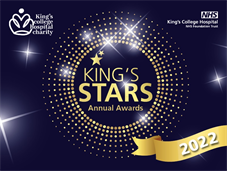Vote for your Lifesaver of the Year
21 October 2022 - Public vote open for King's Stars Annual Awards

On Thursday 24 November, staff from across King’s College Hospital NHS Foundation Trust will gather to celebrate the King’s Stars Annual Awards, supported by King’s College Hospital Charity.
The awards are an opportunity to recognise and celebrate just some of our hard-working staff and teams at the Trust. For one of our award categories, the Lifesaver of the Year award, we will be deciding the winner via a public vote.
The Lifesaver award is for an individual who, or team which, has had a uniquely positive impact on someone’s life; for example, by performing a life-saving intervention, positively transforming a patient’s life, or helping to make a patient’s life easier once they leave hospital.
There are three nominees to choose from and you can cast your vote here. Anyone can vote, including patients, staff, and members of the public. The voting will close at 12pm on 28 October 2022 and the winner will be announced at the King’s Stars Annual Awards ceremony on 24 November. Thank you to King’s College Hospital Charity for their support of the awards.
The three nominees are:
Dr Kavya Pillai, Junior Doctor
In April 2022, Dr Pillai was on her way home from a night shift when she stopped to help 85-year-old Margaret Mann, who had fallen and broken her arm at Upton Park Station.
Margaret was rushing to visit her sister-in-law Judy, who was near the end of her life when she had her accident. Dr Pillai helped to get Margaret comfortable before arranging a taxi to take her to Judy’s bedside so she could say goodbye.
After the accident, Dr Pillai said: “I’m glad to hear Margaret is doing well. It was a real team effort looking after her at the station. The Transport for London staff helped me organise some of the logistics, as well as getting Margaret a nice cup of strong tea to help keep her warm.
“There were also some lovely members of the public who helped catch her when she fell and stayed to comfort her.
“We managed to get Margaret to King George’s Hospital in a cab with a make-shift sling made from a scarf in the hopes she could say her final goodbyes to her sister-in-law.”
Margaret described the intervention from Dr Pillai and members of the public as “like a miracle”.
Trust vaccination teams
The Trust’s vaccination teams, working across all our hospitals, have gone above and beyond in the past two years to vaccinate patients, the public and their colleagues from COVID-19 and influenza.
Throughout the pandemic, King’s staff have supported the biggest vaccination campaign in the NHS’ history and have played a vital role in keeping our communities safe from the dual threats of COVID-19 and the flu.
A wide range of staff from many different professions have all helped to deliver our vaccination campaigns and we are all extremely grateful for the contribution they have made.
They have worked tirelessly and often with little notice to establish clinics and deliver these life-saving vaccines to hundreds of thousands of people, and in the process, saved countless lives.
Emergency Department, critical care and ECMO service teams
A King’s patient whose heart stopped beating for more than three hours made a full recovery thanks to a “chain of survival” that resulted in rapid access to an artificial heart and lung machine.
Paul Curtis was flown to King’s and put on extracorporeal membrane oxygenation (ECMO) – a machine that takes over the work of the lungs and heart – after a kayaking accident in Maidstone left him in submerged in near-freezing waters for around five minutes, causing life-threatening hypothermia.
His body temperature dropped to just 23 degrees causing his heart to stop beating.
Once at King’s ECMO was used to supply Paul’s vital organs, and especially his brain, with oxygen and warm the blood.
Paul’s partner Christine Cordle, a community nurse, said, “It’s a miracle Paul is with us today. If just one link in Paul’s chain of survival – which included his friend who first administered CPR, the paramedics, air ambulance, A&E and critical care unit at King’s – had broken he wouldn’t be with us now.”
